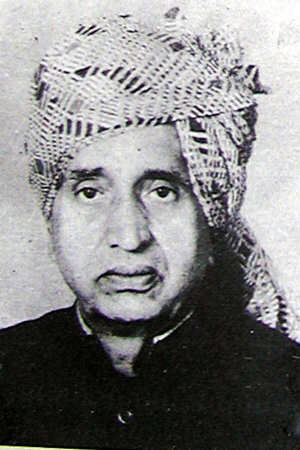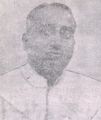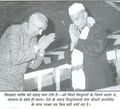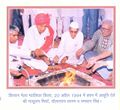Nathu Ram Mirdha
| Author: Laxman Burdak (लक्ष्मण बुरड़क), IFS (R) |

Nathuram Mirdha (20.10.1921-30.8.1996) was a great parliamentarian, freedom fighter, social reformer and popular farmer leader of Marwar region in Rajasthan, India. He was popularly known as Gandhi Baba of Rajasthan.
Policts
MLA Won
- 1952 1957 1962 1985
MP Won
- Nagaur 1971 1977 1980 1989 1991 1996
Minister
- Rajastna 1952 1957 1962
- Centre
- 1979 Minister of State in the Ministry of Agriculture and Irrigation & Minister of State in the Ministry of Finance
- 1989 Union Minister Food & Civil Supplies
Early life
He was born in Rad gotra Jat Hindu family of village Kuchera in Nagaur district in Rajasthan on 20 October 1921. His father’s name was Thana Ram Mirdha. In fact his birth place was Bilada paragana in Jodhpur where his father served under princely state. After death of his father the family moved to Kuchera. His mother's name was Gogi Devi of Manda clan of village Dhadharia Kalan. His younger brother Hari Ram Mirdha was born in 1924. His father Thana Ram died in samvat 1984 (1927 AD) on the day of kartik amawasya.[1]
Education

Nathuram Mirdha passed his matriculation from Darbar High School Jodhpur with first division. He did his MA (Economics) and then obtained LLB degree in 1944 from Lucknow University. He started practice as an advocate in 1946.
Rise as farmer leader
Nathuram Mirdha was simple, soft-spoken but talented personality. He was committed to the service of people especially farmers. He was friendly with every person who came in his contact. He was straightforward and man of words. He organized a massive farmer gathering at Jodhpur under the Chairmanship of Sir Chhotu Ram. He joined the Institution of farmers “Kisan Sabha” founded by Baldev Ram Mirdha as Secretary in 1946.
Nathuram Mirdha visited every village of Marwar region and had person-to-person contact. He united farmers of Marwar against the oppression of Jagirdars under the banner of “Marwar Kisan Sabha” and “Rajasthan Kisan Sabha”. These Institutions developed into very strong organizations and became instruments of social change in abolition of Jagirs and spread of education.
Freedom fighter and political leader
Nathuram Mirdha simultaneously fought feudalism as well as the British during the Indian independence movement. Drawing his strength primarily from the peasantry, he was an undisputed leader of his People for nearly five decades. Nathuram Mirdha made the service of poor farmers and labourers as main objective of his life.
On 15 August 1947 India became free and a popular Ministry was installed in Jodhpur. Recognizing the importance of the Kisan Sabha, its general Secretary Nathuram Mirdha, son of Baldev Ram Mirdha, was included in the Ministry.He won his first assembly election in 1952 from Merta City constituency with a huge majority. He was a Member of the Rajasthan Legislative Assembly from 1952 to 1967 and 1984 to 1989 and held several important portfolios in the Government of Rajasthan. He is known for strengthening agriculture and cooperative sectors in Rajasthan. Commencing from 1972, he was returned to the Lok Sabha six times. He served in the Union Council of Ministers in 1979-80 and 1989-90. He served too, with distinction, as the Chairman of the National Agricultural Prices Commission.
Chairman of National Agricultural Prices Commission
As Chairman of National Agricultural Prices Commission, he implemented a number of schemes to safe-guard the interests of farmers. There is an interesting historical anecdote about the Chairman of the National Agricultural Commission, Nathuram Mirdha, who, when asked by a foreign delegation as to what, according to him, was the culture of India, replied “Only Agriculture and there is no other culture of India”.
He remained Chairman of Maharaja Suraj Mal Institute, New Delhi for ten years. This institute progressed very speedily during his stewwardship.
Differences with Indira Gandhi
Differences developed between Nathuram Mirdha and Mrs. Indira Gandhi in 1975 on the issue of internal emergency. He left the Indian National Congress and joined Lok Dal Party under the leadership of Choudhary Charan Singh. Nathuram Mirdha, then of the Congress, won the 1971 and 1977 elections. He was the only Congress candidate in north India to win in the post-Emergency 1977 Lok Sabha elections. He retained the seat for the Congress-Urs in 1980, and in 1984 kinsman Ram Niwas Mirdha of the Congress defeated him. In 1985 he was leader of Lok Dal in Rajasthan assembly. It was with his efforts and strategy that made Lok Dal party a national level organization. He was state president of Lok Dal Party in 1988. In 1989, contesting on the Janta Dal ticket, Nathuram defeated Ram Niwas.
By 1991 he had joined the Congress, for which party he won the seat in 1991 and 1996.Nathuram Mirdha joined Congress again in 1991 after a period of fourteen years. He was also the Deputy Leader of the Congress-I Parliamentary Party till 1996. In 1996 he got elected to Lok Sabha with a huge majority. That his popularity was undiminished can be seen from the 1996 result: he defeated his BJP rival H Kumawat by almost 160,000 votes. Sadly, he died soon after. In the by-election that followed Nathuram Mirdha's death, the BJP fielded his son Bhanu Prakash Mirdha, a newcomer to politics, and took the seat from the Congress (I).
Gandhi of Rajasthan
Mirdha was a veteran freedom fighter and an accomplished veteran Parliamentarian. He held very important assignments and portfolios with distinction. He was Minister of State for Irrigation, Finance, Food and Civil Supplies and Chairman of many important Parliamentary Committees. He rendered yeoman service to the cause of the farmers, Scheduled Castes, Scheduled Tribes and other weaker sections of the society. His services to the farming community will be long remembered. A lawyer by profession, he also rendered invaluable service in the field of education by establishing many educational institutions and Hostels.

Nathuram Mirdha was a successful politician, leader of farmers and a man of mass appeal in Rajasthan. He was popularly known as Gandhi Baba of Rajasthan.
Death
He passed away on 30 August 1996 in New Delhi at the age of seventy-five.
Books on Nathuram Mirdha
Avarodhon Ke Aar-Paar: Baba Nathuram Mirdha
by Bhagirath Singh Nain (Mob-09950737847)
Published by: Shri Nathuram Mirdha Sewa sansthan, Jodhpur (Rajasthan)
First Edition:2009, Price Rs.150
Distributor:Royal Publication, 18 Shakti Colony, Lane No.2, Loko Shed Road, Ratanada, Jodhpur-342011, Mob-9414272591
This is a book in Hindi language authored by Bhagirath Singh Nain about the life of this great personality.
जाट जन सेवक
रियासती भारत के जाट जन सेवक (1949) पुस्तक में ठाकुर देशराज द्वारा चौधरी बलदेवराम मिर्धा का विवरण पृष्ठ 214-215 पर प्रकाशित किया गया है । ठाकुर देशराज[2] ने लिखा है .... ऑनरेबल चौधरी श्री नाथूराम जी मिर्धा कृषि मंत्री गवर्नमेंट ऑफ जोधपुर - [पृ.214] आप परगना नागौर के गांव कुचेरा के प्रतिष्ठित मिर्धा खानदान में से हैं। आप बचपन से ही बड़े होनहार थे और अपनी निर्भीकता तथा स्पष्टवादिता से अपने स्कूल या कॉलेज में मशहूर हो गए थे। किसान कौम व जाट जाति के प्रति शुरु से ही आपको अथाह प्रेम था। आपने अध्ययन काल में ही अपनी जात सेवा का बीड़ा उठा लिया था और जाट सभा वह किसान सभा की बैठकों, मीटिंग व जलसों में भाग लेने लगे थे। विश्वविद्यालय में पढ़ाई समाप्त करने के बाद अपने उद्देश्य अनुसार किसान कौम की भलाई के लिए वकालत के धंधे में लग गए और किसान सभा का काम भी दिलचस्पी से करने लगे। शीघ्र ही आप किसान सभा के मंत्री चुने गए और मारवाड़ में सर्वदलीय मंत्रिमंडल बनने पर 3 मार्च 1948 को किसानों का प्रतिनिधित्व करने के लिए उक्त मंत्रिमंडल में कृषि-मंत्री बनाए गए। आप बड़े मिलनसार हैं और आपके हाथों में किसानों को अपने हक-हकूकों की रक्षा होने का पूरा विश्वास है। आपने इस अंतरिम काल में
[पृ.215]: जागीरदारों की ज्यादतियों को रोकने के लिए बड़ी योग्यता के साथ कदम उठाया है। एक शासक में जो योग्यता होनी चाहिए वह आपमें है और आपने यह सिद्ध कर दिया है कि जाट स्वभावत: शासक है। आप से किसानों को बड़ी उम्मीदें हैं।
बलवीर घिंटाला तेजाभक्त की कविता
रूतबा न्यारा ठरका न्यारा, हद सोवणा नागौरी उणियारा, के तो अठे रा जाट जाणीजे,के जाणीजे तगड़ा नारा,
गढ कुचेरे रो ठरको भारी,गुवाड़ी कहीजे राड़ां री, जठे जल्मया नाथू बाबा, कड़ काडदी मरोड़ां री,
डरता कदे न राज सूं बाबा,ना डरता कदे चोकी थाणा सूं, करषां न नित हिवड़े लगाया,चोरां न सळटाया ठिकाणा सूं,
दिल्ली मांय नाम चालतो,जद जाता बाबो धोती छिटकार, अफसरां री मनमानी नी चालती,देता पल में ही फटकार,
कुणबो ऊंचो मारवाड़ रो,नर जण्यो इक नाथूराम, जुग पूजे जुग नमन करे,अर जुग निवणे बारम्बार,
बाबा एकर पाछो आज्या,करषा थ्हारा झुर झुर रोवे, मंगता री सिरकारा बणी ह,फसलां रा ए पिसा खोवे,
लोन मिळे न मुआवजा मिळे,मिळे न गरीबां न जीण री ठौर, पूंजीपती दोय हाथ सूं जीमे,करषां न मिळे न रोटी रा कौर,
बाबा थ्हे स्वाभीमान जगायो हो,क अब भाजे है हणमान बेनिवाल, बाकि तो नीरी खाद फैली राज म,कोई न गरीबां रो अब पालणहार,
नी रयो बो ठरको जाट को,नी रयी अब मूंछ्या म ताण, राजनीति नयी नसलां चूंटगी,पढाई लिखाई रो कोनी काम,
घर घर मांय नेता जलमग्या,गुवाड़ां मांय बड़गी पंचायतां, दारू दबेड़ां रो आयो जमारो,थ्हे होता तो आने समझावता,
बाबा पाछा नागाणे आज्याओ,ओ 'तेजाभक्त' पगां पड़े आपरे, जाटां न ओरूं जीणो सीखावो,अरज लगाऊं मान सूं आपरे,
स्मृति शेष- बाबा नाथूराम मिर्धा
जब जब राजनैतिक अनैतिकता व शोषण के विरुद्ध मोर्चाबन्दी होगी, दिल्ली के VIP बंगलो में कोई ग्रामीण बन्धु रात्रि विश्राम हेतु आश्रय कि तलाश में भटकेगा, पशु मेलो में किसान श्वेत वस्त्रो से ढकी लम्बी देहयष्टि को तलासेगा, समाज कि अंतिम पंक्ति का आदमी एक पोस्ट कार्ड डालने से अपना काम होने कि आशा पालेगा, निरंकुश शासन-सरकारों के खिलाफ सशक्त विपक्ष कि भूमिका देखना चाहेगा एव किसान को अपनी उपज के वाजिब दाम मिलने कि चाहत होगी, तब-तब किसान पेशवा बाबा नाथूराम जी मिर्धा याद आते रहेगे..! उतरी भारत कि किसान राजनीति के प्रमुख स्तम्भ, उच्चकोटि के विधिवेता, गांधीवादी विचारक, स्पष्ट व बेबाक वक्ता, पंचायतराज के पोषक एव अपने राजनैतिक जीवन में चार बार विधानसभा व छ बार लोकसभा का चुनाव जीतने वाले बाबा आखिर 30 अगस्त 1996 ई. को मौत से हार गए..! लेकिन उनकी अभिव्यक्ति का दबंग लहजा प्रजातंत्र में आस्था रखने वाली भारतीय जानता को सदैव अपनी आवाज बुलंद करने कि प्रेरणा देता रहेगा..! महान किसान नेता को शत शत नमन... महामानव को कोटि कोटि प्रणाम...
-लेखक- बलवीर घिंटाला तेजाभक्त
Gallery of pictures
-
Nathu Ram Mirdha
-
Nathu Ram Mirdha
-
Book on Nathu Ram Mirdha
-
Nathu Ram Mirdha with Ch. Charan Singh
-
Nathu Ram Mirdha with Ch. Charan Singh
-
Nathu Ram Mirdha with Dr Balram Jakhar
-
Swami Keshwanand with Nathuram Mirdha and Manphool Singh Bhadu, 1963
-
Nathu Ram Mirdha with President Nilam S. Reddy
-
Nathu Ram Mirdha with Smt Kesardevi Mirdha
-
Nathu Ram Mirdha Samadhisthal
-
दौलतराम सारण के साथ महेन्द्र सिंह टिकैत-नाथूराम जी मिर्धा-रामवीर सिंह 20.4.1994
-
श्री दौलतराम सारण और श्री नाथूराम मिर्धा ग्वालियर किसान मेला में 20.4.1994
-
श्री दौलतराम सारण और श्री नाथूराम मिर्धा ग्वालियर किसान मेला में 20.4.1994
-
श्री दौलतराम सारण और श्री नाथूराम मिर्धा ग्वालियर किसान मेला में 20.4.1994
-
दौलतराम सारण के साथ नाथूराम मिर्धा ग्वालियर मेला 20.4.1994 में
References
- ↑ Bhagirath Singh Nain: Avarodhon Ke Aar-Paar: Baba Nathuram Mirdha, Published by: Shri Nathuram Mirdha Sewa sansthan, Jodhpur (Rajasthan), 2009, p.13
- ↑ Thakur Deshraj:Jat Jan Sewak, 1949, p.214-215
Back to The Leaders
















